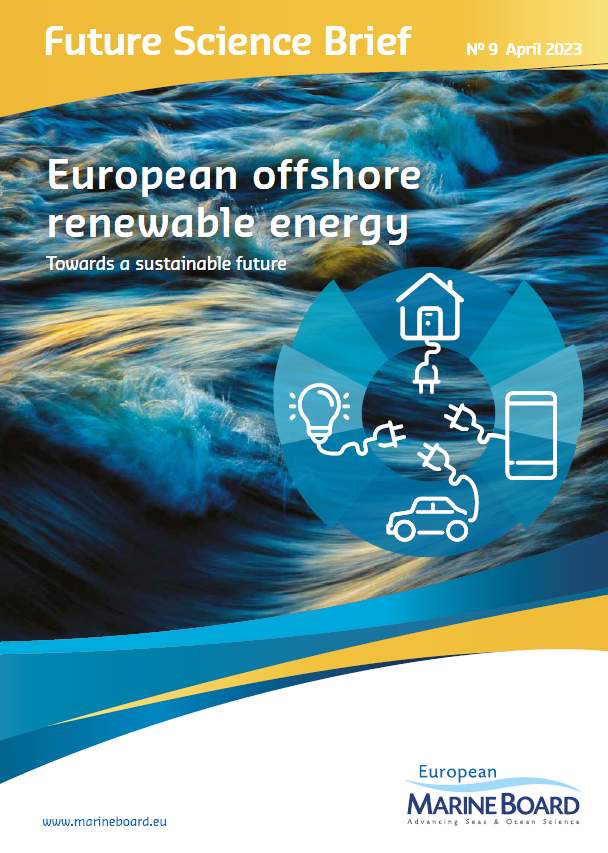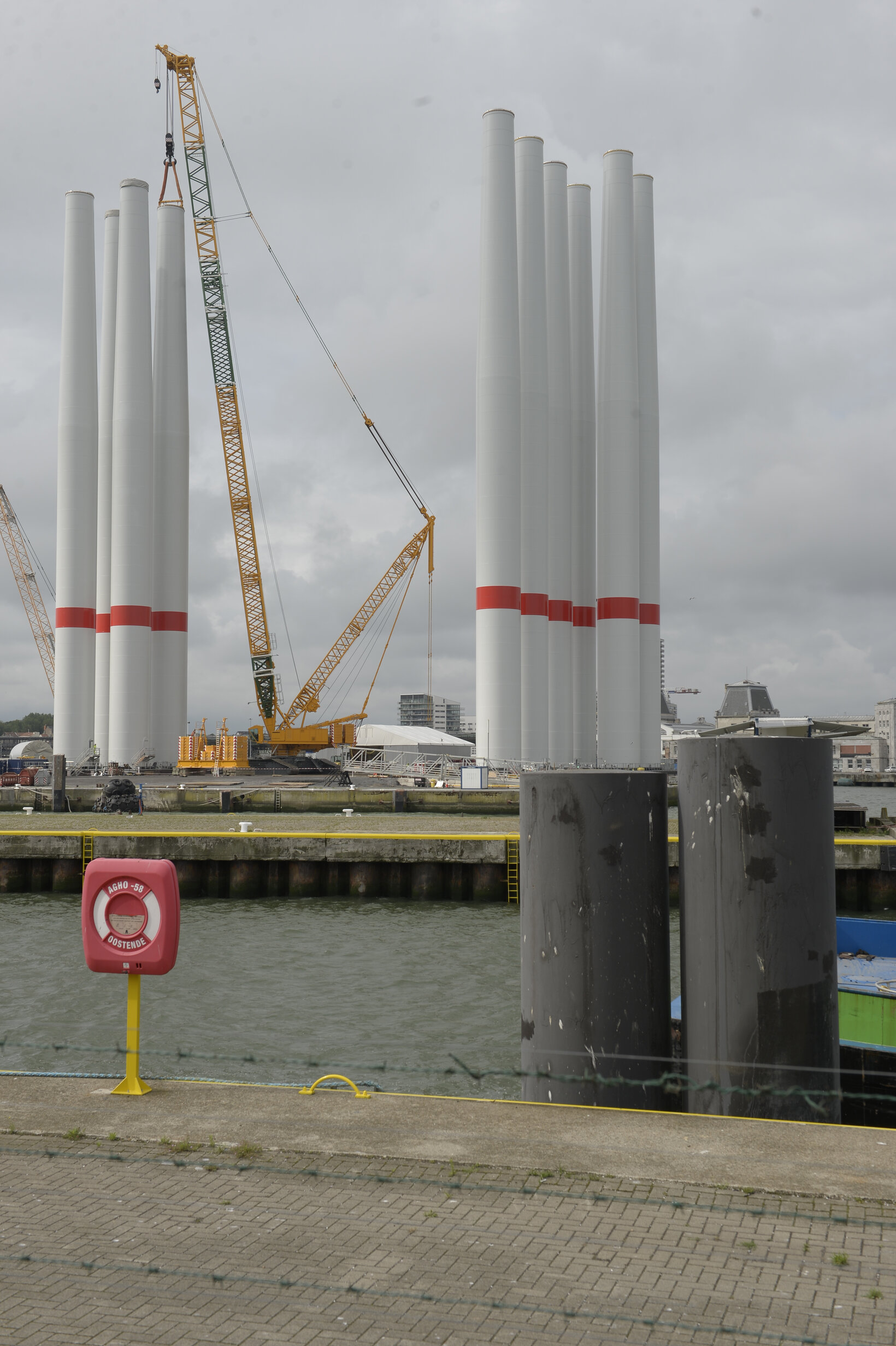Output

Launch webinar on European offshore renewable energy: Towards a sustainable future (April 2023)
Future Science Brief 9, European offshore renewable energy: Towards a sustainable future (April 2023)
News article on Future Science Brief publication (April 2023)
Vision Document 2, Marine Renewable Energy (October 2010)
The recommendations from this document relating to capacity building and training are also being used within the scope of the Pact for Skills for Offshore Renewable Energy and the FLORES project.
Background
Marine sources of renewable energy are typically less mature and less well -established than those on land, although offshore wind could now be considered mature, but still represent an attractive area for growth. However they are of great importance in the scope of efforts to reduce carbon emissions, including within the EU Green Deal, which leads on from the 2015 Paris Agreement and which aims to have “net zero emissions of greenhouse gases by 2050”, and the EU Roadmap to Towards a New Blue Economy. Given the ever increasing and conflicting demands for marine space, particularly in Europe, there is also growing interest in multi-use of space, and the co-location of marine renewable energy installations with other activities. The potential ecological impacts of marine renewable energy projects, either in isolation or cumulative, have resulted in significant delays in the consenting of offshore wind farms. The ecological constraints to marine renewables targets as part of the ‘green recovery’ will become increasingly important considerations in the future as the pace of development accelerates. Another aspects to take into consideration is the relevance of enhanced regional cooperation (R&I and along the whole value chain) and cross-border projects that can contribute to further integration of the energy that is being generated offshore. The impacts of marine renewable energy systems throughout their lifetimes, from site identification and installation to operation and decommissioning, need to be understood and appropriately managed. It is therefore timely to revisit this topic and to help provide a clear understanding of the state of the art and recommendations for development.
-established than those on land, although offshore wind could now be considered mature, but still represent an attractive area for growth. However they are of great importance in the scope of efforts to reduce carbon emissions, including within the EU Green Deal, which leads on from the 2015 Paris Agreement and which aims to have “net zero emissions of greenhouse gases by 2050”, and the EU Roadmap to Towards a New Blue Economy. Given the ever increasing and conflicting demands for marine space, particularly in Europe, there is also growing interest in multi-use of space, and the co-location of marine renewable energy installations with other activities. The potential ecological impacts of marine renewable energy projects, either in isolation or cumulative, have resulted in significant delays in the consenting of offshore wind farms. The ecological constraints to marine renewables targets as part of the ‘green recovery’ will become increasingly important considerations in the future as the pace of development accelerates. Another aspects to take into consideration is the relevance of enhanced regional cooperation (R&I and along the whole value chain) and cross-border projects that can contribute to further integration of the energy that is being generated offshore. The impacts of marine renewable energy systems throughout their lifetimes, from site identification and installation to operation and decommissioning, need to be understood and appropriately managed. It is therefore timely to revisit this topic and to help provide a clear understanding of the state of the art and recommendations for development.
This working group provides input to the UN Decade of Ocean Science for Sustainable Development (2021-2030) societal outcome that aims for a sustainable and productive ocean.
Objectives
The EMB activity on marine renewable energy will seek to provide an update on status and recommendations related to this topic since the 2010 EMB Vision Document 2, to highlight the current knowledge and research gaps in marine science, including in relation to the impact of marine renewable energy systems on marine ecosystems, and to consider future implications as this sector continues to mature.
Specifically, the objectives of this group could include but will not be limited to:
- Providing an overview of current offshore renewable energy systems, their relative maturity, and their existing and foreseen carbon emission reduction potential, taking into consideration other work done in this field;
- Considering the potential impacts of marine renewable energy systems on marine ecosystems and biodiversity throughout their lifetime from design, installation (including nature-based solutions) and site selection to decommissioning, and highlighting knowledge gaps and research needs;
- Highlighting the role of marine research infrastructures (e.g. research vessels and autonomous systems) in advancing energy research and innovation;
- Exploring current policy and governance approaches applied in Europe, including the Renewable Energy Directive II, the Habitats Directive, Maritime Spatial Planning (MSP), Environmental Impact Assessments (EIA’s) and Marine Strategy Framework Directive (MSFD), 2030 Climate and Energy Framework, Renewable Energy Directive, Common Fisheries Policy (CFP), Integrated Maritime Policy (IMP), Water Framework Directive (WFD), EU Recommendation on Integrated Coastal Zone Management, and highlighting opportunities for consolidation and standardization;
- Identifying major conflicts associated with marine renewable energy systems that can arise and where trade-offs will have to be considered, as well as opportunities such as multi-use of marine space;
- Considering the human dimension including socio-economic factors, training and capacity building needs, and public perception, to ensure a just transition in energy;
- Assessing the effects of climate change on the availability of marine renewable energy potential; and
- Where appropriate, proposing updates to the recommendations presented in EMB Vision Document 2.
Terms of Reference
The Terms of Reference produced for the operation and objectives of this Working Group can be consulted here (November 2020).
Meetings
- 4 June 2021
- 8 July 2021
- 31 August 2021
- 2 February 2022
Members
Chair: Takvor Soukissian, HCMR, Greece
Co-Chair: Anne Marie O'Hagan, MaREI, UCC, Ireland
Working group members:
Arianna Azzellino, Polytechnic University of Milan, Italy
Ferdinando Boero, CoNISMa, Stazione Zoologica Anton Dohrn, CNR-IAS, Italy
Ana Brito e Melo, WavEC, Portugal
Patricia Comiskey, Simply Blue Group, Ireland
Zhen Gao, Norwegian University of Science and Technology, Norway
Dickon Howell, Howell Marine Consulting, UK
Marc Le Boulluec, Ifremer, France
Christophe Maisondieu, Ifremer, France
Beth E. Scott, University of Aberdeen, UK
Elisabetta Tedeschi, NTNU, Norway and University of Trento, Italy
Additional Contribution:
Alireza Maheri, University of Aberdeen, UK
Shona Pennock, University of Edinburgh, UK
You can find out more about the working group that produced the previous document here.
EMB Communication Panel support: Kelle Moreau - RBINS, Belgium
Contact at European Marine Board Secretariat: Paula Kellett Email